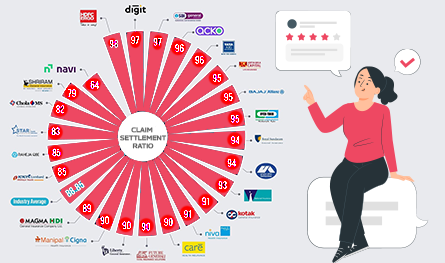Related Articles
 Jan 08, 2025
Jan 08, 2025
Is Varicose Vein surgery covered under the health insurance policy in India
 Health Insurance
Health Insurance

Health insurance is a critical financial safeguard, but choosing the right provider requires more than just comparing premiums. One of the key factors to consider is the Claim Settlement Ratio (CSR) and Incurred Claim Ratio (ICR). These metrics indicate how well an insurer honours claims, but they should not be the only criteria. This article explores the importance of these ratios, industry data, and how you can ensure a smooth claim process.

CSR represents the percentage of claims settled by an insurer in a given financial year. A higher CSR means a greater likelihood that your claim will be approved.
Example: If an insurer receives 10,000 claims and settles 9,500, the CSR would be 95%.
ICR reflects the total claims paid by an insurer as a percentage of the total premium collected in a year. A very high ICR (over 100%) indicates the company is paying out more than it earns, which could raise sustainability concerns. Conversely, a very low ICR may suggest that the insurer is stringent in claim approvals.
Example: If an insurer collects ₹1,000 crore in premiums and pays ₹800 crore in claims, the ICR is 80%.
A Claim Settlement Ratio can never be more than 100%, but the incurred claim ratio can be.
While high CSR and balanced ICR indicate reliability, they do not guarantee seamless claim settlement. Other factors like hospital network, customer service, exclusions, and ease of claim processing should also be considered.
Industry Snapshot: Claim Rejections & Repudiations
These figures highlight the importance of choosing insurers with efficient and transparent claim processes.
1. New India Assurance (Public Sector)
2. Aditya Birla Health (Standalone Health Insurer)
3. Top Private General Insurers
While Claim Settlement Ratio (CSR) and Incurred Claim Ratio (ICR) are important, they are not the only metrics to consider when selecting a health insurance policy. Here are other crucial factors:
Even the best insurance policy won’t be useful if your claim gets rejected due to avoidable mistakes. Follow these steps for a hassle-free settlement:

Paybima Team
Paybima is an Indian insurance aggregator on a mission to make insurance simple for people. Paybima is the Digital arm of the already established and trusted Mahindra Insurance Brokers Ltd., a reputed name in the insurance broking industry with 17 years of experience. Paybima promises you the easy-to-access online platform to buy insurance policies, and also extend their unrelented assistance with all your policy related queries and services.
.png)
Fixed Deposits (FDs) are one of the most popular and safest investment options in India. Among the various banks offering FD schemes, Equitas Small Finance Bank stands out for its competitive interest rates and flexible investment plans. If you're thinking of investing in Equitas Fixed Deposits in 2025, this guide will help you understand the FD calculator, eligibility criteria, and the interest rates offered by the bank.

.png)
Taking a personal loan is a big financial decision, and one of the smartest things you can do before applying is to calculate your monthly EMI. If you're considering a loan from Punjab National Bank (PNB), the PNB Personal Loan EMI Calculator is your best friend.

.png)
Learn everything you need to know about the Post Office Fixed Deposit (FD) scheme, including the FD calculator, eligibility criteria, and 2025 interest rates. Discover the benefits of investing in this secure and government-backed savings option, along with the new FD scheme introduced for senior citizens. Whether you're a beginner or experienced investor, this guide will help you make an informed decision for your financial future.

.png)
Are you planning to take a personal loan from SBI (State Bank of India)? One of the first steps in smart loan planning is to calculate your monthly EMI—so you know how much you’ll pay and whether it fits your budget.
That’s where the SBI Bank Personal Loan EMI Calculator comes in handy. In this blog, we’ll explain what it is, how it works, how to use it, and why it’s an essential financial tool before applying for a loan.

.png)
Saving money is always a wise choice, especially when you want it to grow safely over time. One of the most trusted and traditional ways to do that in India is through Fixed Deposits (FDs). The Bank of Maharashtra, a government-owned public sector bank, offers excellent FD schemes with competitive interest rates and flexible options for different types of investors.
